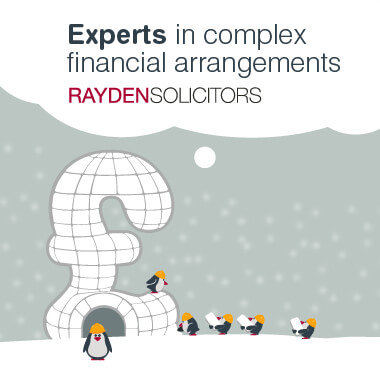

Tax on divorce and separation
The famous dictum that “the only two certainties in life are death and taxes” is certainly true given how often tax issues appear in almost all aspects of family law where finances are an issue.
Areas where tax may need to be considered carefully include:
- Prenuptial and postnuptial agreements
- Divorce and/or separation from your partner
- Financial provision for you, your partner and/ or your child(ren) following divorce or separation
Specific examples in practice include:
- Assessing the inherent tax liabilities associated with the vesting of an asset (e.g. shares or share options in an employer company) or upon the sale of any assets.
- If one spouse or partner is to remain in the family home but the other is to continue to have a financial interest in the property, how best to structure that arrangement from a tax perspective?
- Dealing with the transfer from one spouse or partner to the other of any interest in a second home, in the family business or company or indeed any other asset of the relationship. In this case, the tax effect for each party will vary greatly depending on the circumstances of the case, and future tax liabilities must also be carefully considered, as well as the immediate position.
- Pension splitting or sharing or accessing cash from pension funds to facilitate immediate financial provision.
- Certain state benefits, such as Child Benefit, Tax Credits or Universal Credits, and how this interrelates with income tax and how a change in a family’s living arrangements may change entitlement.
- Capital Gains Tax (CGT) liabilities can impact heavily on financial settlements – when one party leaves a home on separation, Principal Private Residence exemption has been extended for the spouse who has vacated as long as it continues to be the other spouse’s main residence.
In many of the above situations, the position will be more complicated if one party is a foreign national or non-UK domiciled. In the case of unmarried couples, the tax implications on asset transfers, particularly with regards CGT and Inheritance Tax, are also different to those affecting married couples.
Rayden Solicitors provide quality advice at an affordable rate enabling a broad range of clients to manage the financial negotiations effectively.
It is essential that you have expert advice from a solicitor that understands these issues. Rayden Solicitors will assist you in getting the correct support.
Rayden Solicitors is committed to equality and diversity and in doing so supports and advises all members of our community.
The Tax and Financial Implications of a Divorce FAQs
How do I protect myself financially in a divorce?
Divorces are financially complicated, and many couples choose to opt for the protection of a prenuptial or postnuptial agreement, which sets out their entitlements in the event of a divorce. However, an experienced divorce solicitor such as Rayden Solicitors can offer detailed, careful advice to guide you through financial negotiations and ensure you are protected.
Do I have to pay tax on my divorce settlement?
You do not have to pay tax on any lump sums received under a divorce settlement. Transfer of property between two parties in the event of a divorce or dissolution can be transferred without tax falling immediately due:
- Within three years of the end of the tax year of separation; or
- Before the final divorce order; or
- At any time as part of a formal divorce settlement.
Is there a Capital Gains Tax on transferring property on divorce?
Ordinarily, you do not have to pay Capital Gains Tax (CGT) when the property is transferred as part of divorce proceedings, as long as the transfer takes place within three years of the end of the tax year in which the parties separated or before they are finally divorced, or on transfers taking place at any time under a final order on divorce.
However, whilst transfers can occur on a “no loss, no gain” basis, CGT might be payable later when the property is disposed of unless Private Residence Relief can be claimed. For example, if a rental property is transferred from the joint names of spouses to one party’s sole name as part of a divorce settlement, no CGT may immediately be payable, but there may be a significant “rolled over” CGT liability when the property is eventually sold, which reduces the value of the property being transferred. It is, therefore, important to understand the potential for CGT in the future and not just at the time of the transfer.
Do I have to pay income tax on maintenance payments, or is there any tax relief on maintenance payments being made?
No tax is paid on maintenance payments received. The paying party must pay maintenance from their post-tax income, and there is no tax relief on making maintenance payments (unless either party was born before 6 April 1935).
Speak to us
If you would like to arrange a first meeting or have any questions, please contact us or fill in the enquiry form below.











